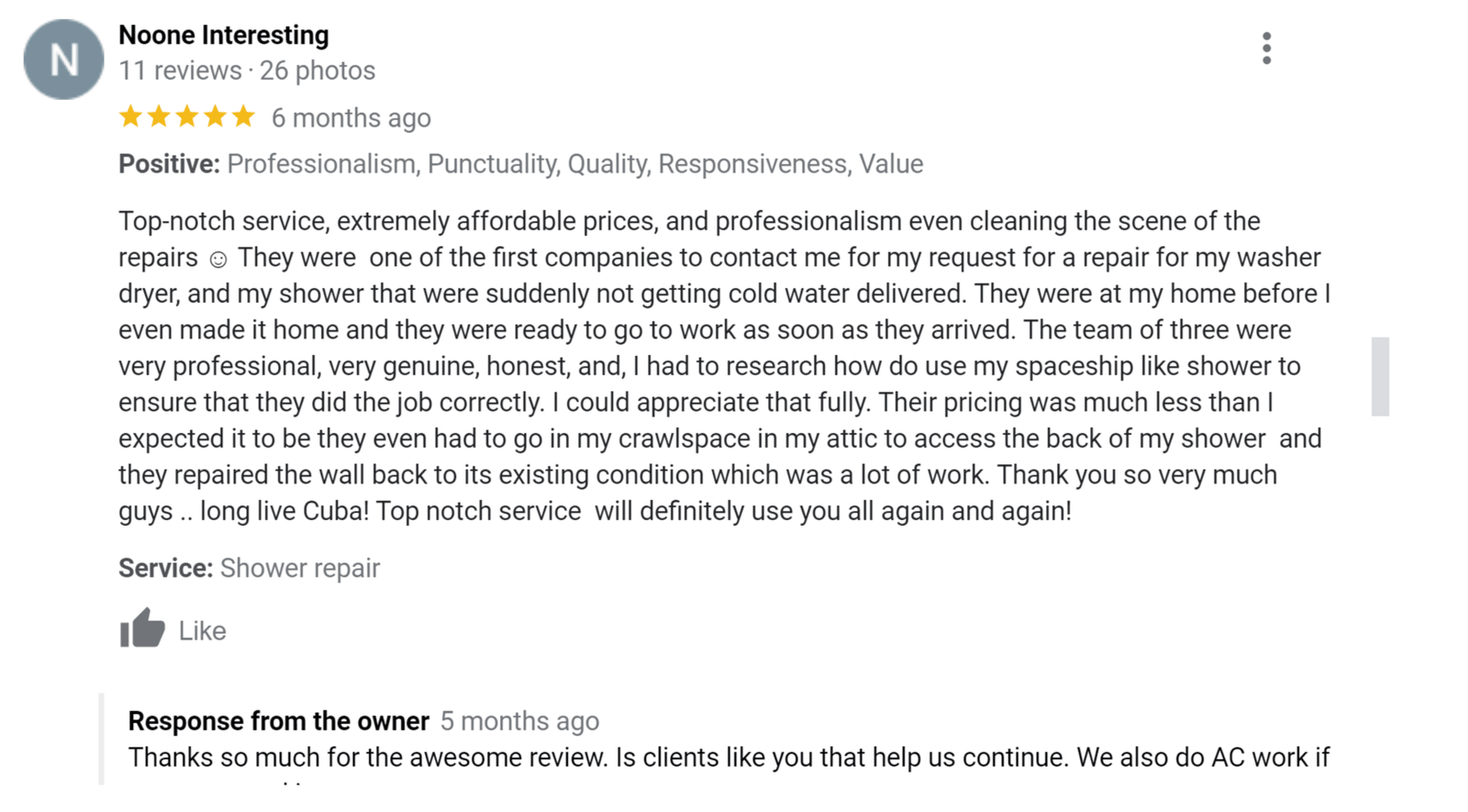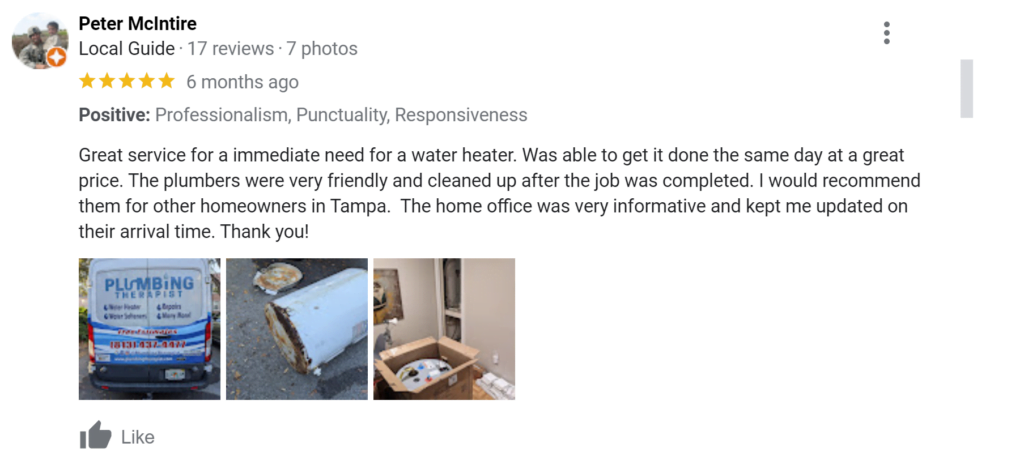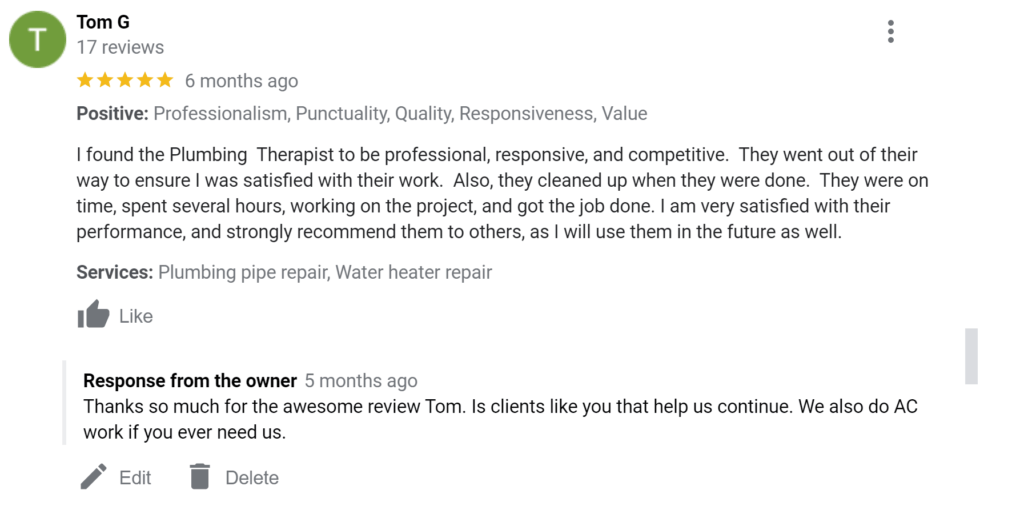Water Heater Maintenance
At Plumbing Therapist, we offer expert water heater maintenance services in the Tampa Bay area. Our team of skilled technicians will inspect your water heater, flush out sediment, check for leaks, and ensure all components are functioning correctly. Regular maintenance not only extends the life of your water heater but also improves its energy efficiency, saving you money on utility bills.
Do You Need Our Help ?
Feel free to contact us now
$99 Water Heater Flush + Free Plumbing System Inspection
Water Heater Maintenance in Tampa Bay
Expert Water Heater Maintenance Services in Hillsborough County, Pinellas County, and Pasco County
Welcome to Plumbing Therapist, your trusted partner for top-notch water heater maintenance services in the Tampa Bay area. We understand the importance of a reliable hot water supply, and our team of skilled technicians is here to ensure your water heater stays in optimal condition year-round.
Why choose us?
A well-maintained water heater not only provides you with a consistent supply of hot water but also saves you money in the long run. Here’s why regular water heater maintenance is crucial:
1. Improved Efficiency: Over time, sediment buildup can hinder your water heater’s performance. Our maintenance services include flushing out sediment, ensuring your system operates at peak efficiency, which can lower your energy bills.
2. Extended Lifespan: Neglecting maintenance can lead to premature water heater failure. Our experts inspect and address potential issues before they become major problems, helping you get the most out of your investment.
3. Peace of Mind: With Plumbing Therapist’s regular maintenance, you can enjoy the peace of mind that comes with knowing your water heater is in excellent condition. No more unexpected cold showers or emergencies.
Our Water Heater Maintenance Services: At Plumbing Therapist, we offer comprehensive water heater maintenance services tailored to your needs. Here’s what you can expect:
1. Thorough Inspection: Our technicians will carefully inspect your water heater, checking for any signs of wear, leaks, or corrosion.
2. Sediment Removal: We’ll flush out sediment that accumulates at the bottom of your tank, ensuring efficient heating and preventing damage.
3. Testing and Calibration: We test and calibrate your water heater’s thermostat and pressure relief valve to ensure they function correctly.
4. Anode Rod Inspection: If your water heater has an anode rod, we’ll inspect it for corrosion and replace it if necessary to protect your tank.
5. Recommendations: Our experts will provide you with recommendations for any repairs or improvements to enhance your water heater’s performance.
Don’t wait until your water heater breaks down. Trust Plumbing Therapist to keep your water heater running smoothly and efficiently. We offer flexible scheduling, competitive pricing, and a commitment to customer satisfaction.

Why partner with Plumbing Therapist?
Quality, Affordability, and Expertise.

No Hidden or Unexpected Charges

Free Estimates & Online Booking Available

Professionally Trained Technicians

Honesty is Guaranteed

Quick Communication & Service Within 24 Hours

400+ 5 Star Reviews

Why Is Water Heater Maintenance Necessary?
Water heater maintenance is necessary for several important reasons:
Efficiency: Over time, sediment and mineral buildup can accumulate at the bottom of your water heater tank. This sediment acts as insulation, making it harder for your heating element or burner to efficiently heat the water. Regular maintenance includes flushing out this sediment, ensuring your water heater operates at peak efficiency. This, in turn, can lower your energy bills.
Prolonged Lifespan: Neglecting maintenance can lead to the premature failure of your water heater. Routine maintenance allows technicians to identify and address potential issues before they become major problems. This can significantly extend the lifespan of your water heater, saving you the cost of an early replacement.
Consistent Hot Water Supply: A well-maintained water heater provides a consistent and reliable supply of hot water. This is particularly important for daily activities like showering, doing dishes, and laundry. Without maintenance, your water heater may experience fluctuations in water temperature or even complete failure.
Cost Savings: Regular maintenance is an investment that can lead to significant cost savings over time. By preventing major breakdowns and ensuring your water heater runs efficiently, you’ll spend less on repairs and utility bills.
Safety: Neglected water heaters can develop leaks or even pose safety hazards. Maintenance includes a thorough inspection of your system, identifying any potential safety issues and addressing them promptly.
Warranty Compliance: Many water heaters come with warranties, but these warranties often require regular maintenance to remain valid. If you neglect maintenance, you could void your warranty, leaving you responsible for the full cost of repairs or replacements.
Environmental Impact: An efficient water heater consumes less energy, which is not only cost-effective but also environmentally friendly. By maintaining your water heater, you reduce your carbon footprint.
In conclusion, water heater maintenance is essential for ensuring your system operates efficiently, lasts longer, provides a consistent hot water supply, and saves you money in the long run. Regular maintenance is a small investment that offers significant benefits in terms of comfort, cost savings, and peace of mind.
If you would like more information, feel free to give them a call at (813)-437-4477 or you can book online and get their latest discount!
Customer Testimonials: Real Experiences with Plumbing Therapist
We proudly share the experiences and stories of our valued clients. Their feedback provides a glimpse into the quality of service and commitment to excellence we uphold at Plumbing Therapist. You'll read firsthand how our plumbing solutions have improved comfort and efficiency in homes across Tampa Bay. These testimonials illustrate our dedication to customer satisfaction and the difference our expert services can make.




Your questions answered
Common Water Heater Maintenance Questions:
What happens if you don't maintain your water heater?
Neglecting to maintain your water heater can lead to various problems and consequences, including:
Reduced Efficiency: Over time, sediment and mineral deposits can accumulate in the bottom of the water heater tank. This buildup acts as insulation, making it more challenging for the heating element or burner to efficiently heat the water. As a result, your water heater will use more energy to produce the same amount of hot water, leading to higher utility bills.
Shortened Lifespan: Without regular maintenance, your water heater is more prone to wear and tear. This can result in premature failure, meaning you’ll need to replace your water heater sooner than expected, which is a significant expense.
Inconsistent Hot Water: Neglected water heaters may experience fluctuations in water temperature. You might notice that your hot water isn’t as hot as it used to be, or you may run out of hot water more quickly during showers or other daily activities.
Leaks and Water Damage: Over time, corrosion can weaken the tank’s integrity, leading to leaks. A leaking water heater can cause water damage to your home, potentially damaging walls, floors, and belongings.
Safety Hazards: Failing to maintain your water heater can lead to safety hazards. For example, if the pressure relief valve or temperature and pressure relief valve malfunctions, it can result in excessive pressure buildup, which could lead to a burst tank or an explosion.
Voided Warranty: Many water heaters come with warranties, but these warranties often require regular maintenance to remain valid. If you neglect maintenance, you could void your warranty, leaving you responsible for the full cost of repairs or replacements.
Higher Repair Costs: Small issues that could have been addressed through routine maintenance can escalate into major problems that require costly repairs or replacements. Neglecting maintenance can lead to more extensive and expensive repair bills.
Energy Waste: An inefficient water heater consumes more energy, which not only increases your utility bills but also has a negative environmental impact by contributing to higher energy consumption and greenhouse gas emissions.
In summary, failing to maintain your water heater can result in reduced efficiency, a shortened lifespan, inconsistent hot water supply, leaks, safety hazards, voided warranties, higher repair costs, and increased energy consumption. Regular maintenance is essential to ensure your water heater operates efficiently, safely, and cost-effectively while providing you with a reliable supply of hot water.
Does a water heater tank need maintenance?
Yes, a water heater tank does need regular maintenance to ensure it operates efficiently and lasts as long as possible. Here are some key maintenance tasks for a water heater tank:
Flushing the Tank: Over time, sediment and mineral deposits can accumulate at the bottom of the tank. This buildup can reduce the efficiency of your water heater by acting as insulation, making it harder for the heating element or burner to heat the water. Flushing the tank periodically helps remove this sediment, improving efficiency.
Checking the Anode Rod: Many water heaters have a sacrificial anode rod that helps prevent tank corrosion. This rod should be inspected during maintenance and replaced if it’s heavily corroded to protect the tank from rusting.
Inspecting for Leaks: Regularly check for any signs of leaks around the tank, including at the connections, relief valve, and bottom of the tank. Address any leaks promptly to prevent water damage and further deterioration.
Testing the Pressure Relief Valve: The pressure relief valve is a safety feature that releases excess pressure in the tank. It should be tested during maintenance to ensure it functions correctly. If it’s not working properly, it should be replaced.
Checking for Corrosion: Inspect the tank and its components for signs of corrosion or rust. Address any corrosion promptly to prevent tank damage.
Inspecting Venting and Gas Connections (for gas water heaters): If you have a gas water heater, it’s essential to check the venting system and gas connections for any issues that could affect safety and performance.
Testing the Thermostat: Ensure that the thermostat is calibrated correctly to maintain the desired water temperature.
Checking for Sediment at the Cold-Water Inlet: Some sediment may accumulate at the cold-water inlet, affecting the efficiency of the dip tube. Cleaning or replacing the dip tube may be necessary if sediment buildup is significant.
Insulating the Tank (optional): Adding insulation to your water heater tank can improve its energy efficiency. However, this is typically not necessary for newer, well-insulated tanks.
Reviewing the Owner’s Manual: Consult your water heater’s owner’s manual for specific maintenance recommendations and guidelines.
Regular maintenance of your water heater tank helps ensure it operates efficiently, extends its lifespan, and reduces the risk of unexpected breakdowns. It’s a cost-effective way to maximize the performance and longevity of your water heater.
What does a water heater maintenance include?
Water heater maintenance typically includes a series of tasks and inspections to ensure the system operates efficiently and safely. Here’s a breakdown of what a comprehensive water heater maintenance service typically includes:
Tank Inspection: A thorough visual inspection of the water heater tank to check for signs of corrosion, leaks, or other visible issues.
Flushing the Tank: This involves draining the tank to remove sediment and mineral buildup from the bottom. Flushing helps maintain efficient heat transfer and prevents corrosion.
Anode Rod Inspection: Checking the sacrificial anode rod for signs of corrosion or wear. If the rod is significantly corroded, it should be replaced to protect the tank from rusting.
Pressure Relief Valve Testing: Testing the pressure relief valve to ensure it’s functioning correctly. This valve releases excess pressure to prevent tank ruptures.
Temperature and Pressure Check: Measuring and adjusting the thermostat setting as needed to maintain the desired water temperature. Also, verifying that the temperature and pressure relief valve is set to the correct pressure.
Gas Connections (for gas water heaters): Checking gas connections and the venting system to ensure there are no leaks or safety hazards.
Vent Inspection (for gas water heaters): Ensuring that the flue or vent is clear and properly venting combustion gases outside. Any blockages or issues can pose a safety risk.
Cold-Water Inlet Inspection: Checking for sediment buildup at the cold-water inlet. If significant sediment is present, the dip tube may need cleaning or replacement.
Combustion Chamber Cleaning (for gas water heaters): If necessary, cleaning the combustion chamber to improve combustion efficiency.
Pilot Light (for gas water heaters): Ensuring that the pilot light is burning correctly and relighting it if necessary.
Gas Burner Inspection (for gas water heaters): Checking the gas burner for proper ignition and flame patterns.
Drain Valve Inspection: Checking the drain valve for any signs of leakage or corrosion. If the valve is not working correctly, it may need to be replaced.
Insulation Inspection: Inspecting the insulation around the tank and making recommendations for adding or replacing insulation if necessary for energy efficiency.
Owner’s Manual Review: Providing the homeowner with information on the water heater’s maintenance schedule and guidelines for regular homeowner care.
Recommendations: Providing recommendations for any necessary repairs or improvements to the water heater or its components.
It’s important to note that the specific maintenance tasks may vary depending on the type of water heater (electric or gas) and its age. Regular water heater maintenance helps ensure efficient operation, extend the appliance’s lifespan, and minimize the risk of unexpected breakdowns or safety issues. It’s advisable to have a qualified technician perform this maintenance annually or as recommended by the manufacturer.
How long can a water heater last with proper maintenance?
With proper maintenance and care, a water heater can last significantly longer than it would without maintenance. On average, the lifespan of a well-maintained water heater can range from 10 to 15 years or more. However, the actual lifespan can vary based on several factors:
Type of Water Heater: The type of water heater you have, whether it’s electric or gas, can impact its lifespan. Gas water heaters tend to have a slightly shorter lifespan, typically around 10 to 12 years, while electric water heaters can last closer to 15 years or more.
Water Quality: The quality of the water in your area can affect the lifespan of your water heater. If you have hard water with a high mineral content, it can lead to more rapid sediment buildup and potential corrosion, which can shorten the water heater’s lifespan.
Maintenance Frequency: Regular maintenance, as recommended by the manufacturer, is key to extending the lifespan of your water heater. Flushing the tank, inspecting and replacing the anode rod, and addressing minor issues promptly can significantly increase its longevity.
Proper Installation: A correctly installed water heater is less likely to experience issues. Proper ventilation, adequate space, and accurate sizing are essential for the water heater’s efficiency and lifespan.
Usage Patterns: The frequency and intensity of use also play a role. A water heater that’s used heavily and constantly under high demand may wear out faster than one used more moderately.
Brand and Quality: The brand and quality of the water heater can impact its durability. Investing in a high-quality water heater from a reputable manufacturer may result in a longer lifespan.
Local Climate: Extreme weather conditions in your area can affect the performance and lifespan of your water heater. For example, water heaters in regions with very cold winters might experience more strain.
To maximize the lifespan of your water heater, it’s essential to follow the manufacturer’s maintenance recommendations and have regular inspections and maintenance performed by a qualified technician. Addressing any issues promptly and being proactive about maintenance can help ensure that your water heater operates efficiently and serves you well for many years.
What 3 things should you check on your water heater?
Checking your water heater regularly is an important part of ensuring it operates efficiently and safely. Here are three key things you should check on your water heater:
Temperature and Pressure Relief Valve (T&P Valve): The T&P valve is a crucial safety component of your water heater. It’s designed to release excess pressure and prevent the tank from over-pressurizing. To check the T&P valve:
- Ensure there is a discharge pipe attached to the valve and that it extends to within a few inches of the floor or is directed to a proper drain.
- Lift the valve’s lever slowly and carefully to test it. You should hear water flowing through the discharge pipe. If there’s no water discharge or if the valve leaks afterward, it may need to be replaced.
Anode Rod: The sacrificial anode rod is essential for preventing corrosion inside the water heater tank. Over time, it can become corroded and need replacement. To check the anode rod:
- Turn off the water supply to the heater and, if it’s a gas heater, turn off the gas.
- Locate the anode rod’s access point on the top of the water heater. It’s usually a hexagonal nut.
- Carefully remove the anode rod and inspect it for signs of corrosion or significant wear. If it’s heavily corroded, it’s time to replace it.
Pressure and Temperature Settings: Ensure that the water temperature and pressure settings on your water heater are correctly configured:
- The recommended water temperature setting is typically around 120 degrees Fahrenheit (49 degrees Celsius) to prevent scalding and save energy.
- Check that the pressure setting on the relief valve (if adjustable) is within the manufacturer’s recommended range.
Regularly checking these three crucial components helps maintain the safety and efficiency of your water heater. Additionally, it’s a good practice to schedule professional maintenance at least once a year to address other maintenance tasks, such as flushing the tank and inspecting for leaks or corrosion, which can extend the lifespan of your water heater and ensure it continues to provide reliable hot water.

